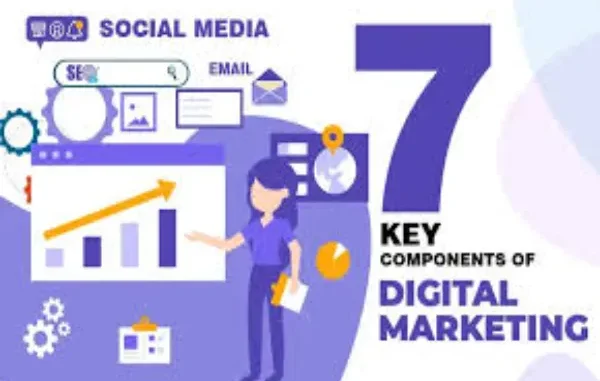

Launching a digital marketing campaign without a strategic foundation is like setting sail without a compass. With consumers bombarded by thousands of marketing messages daily across digital media platforms, only campaigns built on proven fundamentals can cut through the noise and deliver meaningful results. Unlike traditional marketing approaches that relied heavily on broad demographic targeting, today’s digital marketing strategy demands precision and adaptability.
The difference between campaigns that generate genuine business impact and those that drain budgets lies in understanding and implementing seven critical elements that transform scattered online marketing efforts into cohesive, revenue-driving machines.
1. Strategic Audience Definition and Segmentation
The cornerstone of any successful digital marketing campaign begins with laser-focused audience identification. Rather than casting a wide net and hoping for the best, start by developing detailed buyer personas that go beyond basic demographics. This means understanding not just who your customers are, but also why they make purchasing decisions, what pain points keep them awake at night, and which channels they trust for information.
Modern audience segmentation leverages behavioral data, psychographic insights, and purchasing patterns to create micro-audiences that respond to highly tailored messaging. Companies achieving the highest ROI from their digital campaigns often discover that their most profitable segments represent surprisingly narrow slices of their total addressable market. This precision allows for more efficient budget allocation and messaging that resonates on a deeply personal level.
For businesses seeking to implement these sophisticated targeting strategies effectively, partnering with established London-based marketing firms for growing brands or similar companies in your area can accelerate results significantly. These experts bring the expertise needed to execute precise audience research, develop data-driven segmentation frameworks, and implement the advanced analytics required for successful campaign optimization.
2. Compelling Value Proposition and Messaging Architecture
Once you understand your audience intimately, crafting messaging that speaks directly to their needs becomes paramount. Effective digital marketing campaigns build their messaging around a clear value proposition that answers the fundamental question every prospect asks: “What’s in it for me?” This isn’t about listing product features or company credentials; it’s about articulating the specific transformation or outcome customers can expect.
Develop a messaging hierarchy that maintains consistency across all touchpoints while adapting tone and format to suit different platforms and stages of the customer journey. This ensures that whether a prospect encounters your brand through a social media ad, email campaign, or website, they receive a coherent story that builds trust and moves them closer to conversion.
3. Multi-Channel Integration and Optimization
Today’s customers don’t follow linear paths to purchase. They might discover your brand on Instagram, do research on their preferred search engine, compare options on review sites, and finally convert through an email promotion weeks later. Understanding how to leverage various marketing channels strategically is what separates successful campaigns from scattered efforts.
Smart campaign architects design customer journeys that acknowledge this reality, ensuring each channel plays its optimal role in the conversion process. Social media platforms might excel at brand awareness and engagement through influencer marketing partnerships, while email marketing nurtures leads through educational content, and retargeting ads recapture interested prospects who didn’t convert initially. The key lies in understanding each channel’s strengths across various digital marketing channels and creating seamless transitions between them.
4. Data-Driven Performance Measurement
What separates professional digital marketers from amateurs is their relationship with data. Effective campaigns establish clear key performance indicators before launch and implement robust tracking systems to monitor progress in real-time. This goes beyond vanity metrics like likes and shares to focus on business-critical measurements such as cost per acquisition, customer lifetime value, and return on advertising spend.
The most sophisticated campaigns employ attribution modeling to understand which touchpoints truly drive conversions, allowing for more intelligent budget allocation across digital advertising initiatives. They also implement feedback loops that enable rapid optimization based on performance data, treating each ad campaign as a learning opportunity that informs future strategies.

5. Conversion-Optimized User Experience
Even the most brilliant campaign strategy fails if prospects encounter friction when trying to take desired actions. So, pay meticulous attention to the user experience across all conversion paths. This means ensuring landing pages load quickly, forms are intuitive to complete, and the value proposition remains clear throughout the conversion process.
Mobile optimization isn’t optional in today’s landscape, as mobile traffic often represents the majority of campaign interactions. Campaigns that succeed create frictionless experiences regardless of device, with particular attention to page speed, navigation simplicity, and form optimization that removes barriers to conversion.
6. Content Strategy and Value Delivery
Modern consumers have become increasingly resistant to overtly promotional messaging, making content marketing an essential component of effective campaigns. The best digital marketing campaigns position brands as valuable resources rather than just product sellers. This involves creating content that educates, entertains, or solves problems for target audiences while subtly building brand authority and trust. Smart marketers also leverage user-generated content to build authenticity and social proof within their campaigns.
Successful content strategies align with different stages of the buyer’s journey, providing awareness-stage content that addresses broad challenges, consideration-stage content that helps prospects evaluate solutions, and decision-stage content that facilitates the final purchase decision. This approach builds relationships that extend far beyond individual transactions.
7. Continuous Testing and Iteration
Effective campaigns build testing into their DNA, constantly experimenting with different headlines, images, targeting parameters, and calls-to-action to improve performance. This isn’t about making random changes, but about systematic testing that provides statistical confidence in results.
The most successful digital marketing teams embrace a culture of experimentation, viewing every campaign element as a hypothesis to be tested rather than a fixed component. They understand that what works today might not work tomorrow, and they build flexibility into their campaigns to adapt quickly to changing market conditions and consumer behaviors.
Conclusion
The brands that consistently achieve exceptional results from their digital marketing investments are those that view these seven elements not as separate tactics, but as interconnected components of a larger strategy. These effective marketing strategies understand that sustainable success comes from building campaigns that create genuine value for customers while achieving measurable business outcomes. In an increasingly competitive digital landscape, this holistic approach is essential for survival and growth.
Leave a Reply